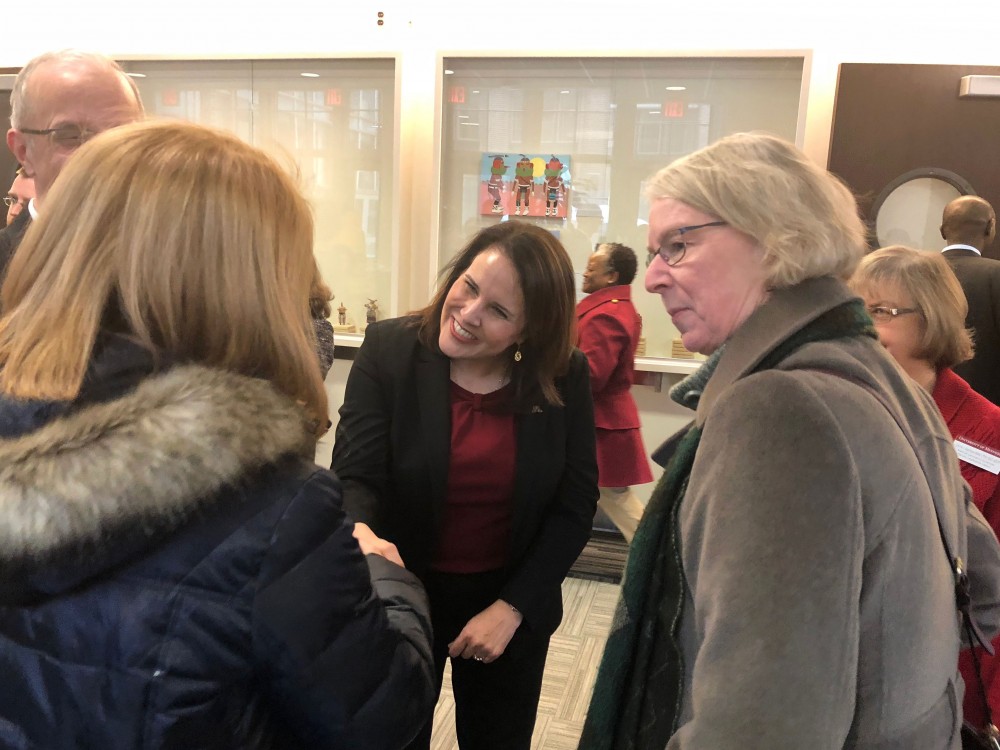University of Minnesota presidential finalist Joan Gabel made her first public appearance on Monday at Coffman Memorial Union — the start of a weeklong visit to all five University system campuses.
Gabel, who currently serves as provost at the University of South Carolina, fielded questions from University members on topics including mental health, sexual assault and diversity on campus, challenges to the University and changes in higher education.
“Those of us who have been doing this for awhile have been really seeing palpable change in what it means to be part of this really noble enterprise of education and discovery and community engagement,” Gabel said in her opening remarks.
Although there is a lot of uncertainty, Gabel said the University is well-prepared to take on the future.
“The universities that will emerge better from this time of transition … have a deep investment in discovery, that understand what students need in the classroom and beyond the classroom, [and] that understand what it means to serve their state while they impact the world,” Gabel said. “And this University knows how to do that.”
When asked about increased public skepticism of higher education, Gabel said the University can do a better job sharing expertise and connecting with the public.
“I think this is the new approach that University presidents need to have: in addition to facilitating and stewarding a well-run institution … they are prepared to talk to various stakeholders and constituencies,” she said.
Describing her leadership style as “collaborative,” Gabel said she would welcome questions, push-back and discussion about her decisions.
“There’s no way one person can know everything,” she said. “You surround yourself with really smart people. Who balance each other well, who balance you well.”
Gabel said she would be “visible,” show up to events and “evoke a sense of approachability” with students on campus.
“It’s really important to be boots-on-the-ground with students,” she said.
She also acknowledged that she would become the University’s first woman president, which was met with applause from the audience.
Gabel said she was the first woman to serve as the business school dean at the University of Missouri and provost at the University of South Carolina. However, she said gender is not the only thing that’s important as president.
“I think what’s also important is what you do once you’re in the job,” she said. “Five minutes after you start it’s about the work.”
Several questions focused on long standing issues affecting the University and other schools across the country, including mental health concerns, sexual assault prevention and diversity on campus.
On mental health, she highlighted her work as provost at the University of South Carolina in hiring more counselors, making it easier to get an appointment and preparing faculty to direct students to resources.
Gabel said she supports the University’s public health approach to sexual misconduct and would continue working with experts. “With the expertise and know-how we have on campus, we should be leading the charge,” she said.
The University should also take a leading role when it comes to fostering a more inclusive and diverse community, Gabel said, highlighting that the University of South Carolina worked to ensure students, faculty and staff reflected the diversity of the state’s population.
Other questions focused on fiscal concerns for the University.
Gabel said there are opportunities for “alternative revenue sources,” like funding ways to monetize services from students and faculty. “But I don’t want alternative revenues to start to creep into the core mission,” she said.
But she sidestepped questions about increasing tuition.
“Nationally there’s a definite pressure to contain the cost of higher education,” Gabel said. “There’s no question that we’re in a competitive market place, so we have the combined needs of making sure that education here is accessible but also making sure that the best and brightest students choose us. That is something that intersects in price.”
Gabel said that budget constraints and limited funding will be one of the biggest challenges for the University.
“Everyone in higher education administration, and particularly public higher education administration, will talk about resources and how you keep costs low while making strategic investments in excellence when there are limited resources,” Gabel said at a press conference following the forum.
Commending President Eric Kaler’s work, Gabel said higher education is about being a steward and “leaving something better than when you found it.”
“He has made really strategic moves to reinvest administrative overhead back into the core function enterprise, which I think is difficult and something that should continue,” he said.
While the University maintains a strong research enterprise, student interest in coming to campus, a collaborative relationship with the state legislature and partnerships with corporations, Gabel said there is still more work to be done.
That’s part of what inspired her to apply for the job, she said.
“I can’t imagine a better place that has more balanced high quality set of attributes and assets the University has,” she said. “This University is excellent and yet there are still things we can do, and that is one of the most exciting combinations.”
The Board of Regents will interview Gabel at its meeting on Friday and is expected to vote on her confirmation the following week.
Before that, Gabel will meet with a variety of University members — including groups of faculty, staff and student leaders — across the University system.
“At the start of this search the search advisory committee visited all five campuses across the state to gather input from across the University,” said Amy Pittenger, a member of the presidential search committee, who moderated the first forum.
“Now we’re back where we all started: getting input from the University community,” Pittenger said.








